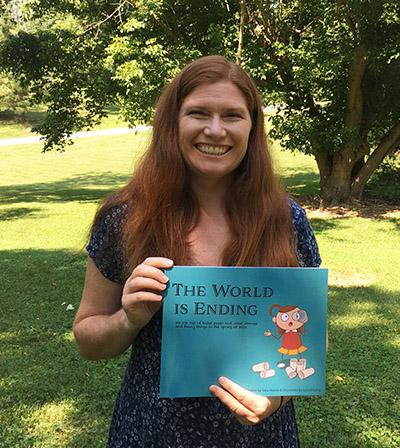After seeing family routines disrupted by the COVID-19 pandemic, Sara Howle decided to combine her love for children and love for literature by creating a book to help parents discuss the changing world with their little ones.
“I’ve always worked with children, both as a teacher and then as a head of school for two years. My passion is helping kids find a voice,” said Howle of Harpers Ferry, W. Va., a Wayland Baptist University graduate.
“When something like this happens in our world and adults get stressed, kids often get quiet. I saw that a lot, and I saw them watch what we’re doing to see what they should do.”

Online publisher Lulu.com recently released The World is Ending, available in both a paperback version and in an e-book. Subtitled “we are out of toilet paper and other strange and funny things in the spring of 2020,” the book features Howle’s writing and illustrations by her friend Lucy Huang, a digital artist.
Howle’s goal is to get the book into the hands of parents to use, not to get rich. All proceeds from sales go to Jefferson County Community Ministries, an organization that provides food, shelter and clothing for families in need in the Harpers Ferry area.
“My hope is that the book can be a tool for parents, so as they sit and read the book with their kids they can ask, ‘Do you feel lonely that you can’t see your friends?’ or ‘Was this weird?’ This is so different for kids, realizing the adults are not in control or don’t have all the answers and haven’t experienced this either. That can be something frightening for children,” Howle said.
Howle believed a book could provide an avenue to bridge the gap for adults to talk about the pandemic with children of any age.
“It often helps when you ask children direct questions about their feelings. When you have those conversations, you realize they are scared or they are stressed but they don’t have the language to express that,” she said. “Sometimes as adults, we don’t know where to start or how to put it in language for children so they are comfortable using their voice.”
She and husband Greg know it firsthand as parents to three—Zaylyn, almost 11, Zamyyah, 8, and Tovy, who turns 2 in August. The family, who spent several years in Australia, were traveling overseas to visit friends there for four months when the pandemic began to make its impact.
Sign up for our weekly edition and get all our headlines in your inbox on Thursdays
“We were there Nov. 11 through March 4, and we had already begun seeing masks as early as January. So, we started having those conversations pretty early on,” Howle said. “When we got back to West Virginia, no one here had seemed to hear much about it. Then it all happened really fast.”
When she decided to write a children’s book, she asked friends on Facebook to pose a question to their children about three areas: something that had changed, something they were feeling and something strange about this time. She then organized the comments and saw the story flow from those thoughts.
“I knew that I wanted to get kids’ perspectives on what they were feeling, and kids can word things sometimes in ways that adults can’t. There is one quote that I love. The kid says: ‘I don’t get to see anyone in the skin anymore; I only see them on the computer,’” Howle said. “Kids just word things in a way that helps us see what they recognize as an issue.”















We seek to connect God’s story and God’s people around the world. To learn more about God’s story, click here.
Send comments and feedback to Eric Black, our editor. For comments to be published, please specify “letter to the editor.” Maximum length for publication is 300 words.